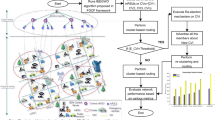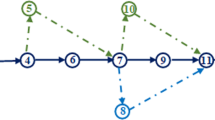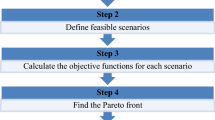Abstract
Emerging technologies, such as the fifth generation (5G) and the Internet of Things (IoT), increase the communication capabilities of components such as smart vehicles in intelligent transportation systems. Consequently, there is a demand for vehicular services to fulfil the purpose of safe driving and comfort in smart transportation and augmented reality assistants. These vehicular services are delay-sensitive tasks and computation-intensive tasks. Hence, these tasks are not ideal for vehicle processing due to stringent deadlines, finite resource constraints and the battery life of vehicles. Therefore, they are handled by offloading into roadside infrastructures (e.g., roadside units or high power nodes), called fog nodes (FNs), for further processing. However, when the delay-sensitive tasks increase in the network during peak time, the processing of such tasks in FNs poses a challenge regarding meeting deadlines and energy consumption. Therefore, we propose an energy and priority-aware scheduling (EPAS) algorithm to handle the delay-sensitive tasks in the overlap coverage areas of fog-enabled vehicular networks (FEVNs) such that the energy consumption of FNs is reduced while meeting deadlines. Task scheduling among FNs is a multiple 0/1 knapsack, a well-known nondeterministic polynomial (NP)-hard problem. Hence, the EPAS is a greedy-based sub-optimal solution to the task scheduling problem with a finite number of tasks and FNs in FEVNs. The performance of EPAS is evaluated by considering the peak arrival of tasks into the network. The simulation outcomes depict that the EPAS algorithm lowers the FN’s energy consumption compared to benchmark algorithms.









Similar content being viewed by others
Data availability
The datasets can be provided on demand.
References
Luo Q, Cao Y, Liu J, Benslimane A (2019) Localization and navigation in autonomous driving: threats and countermeasures. IEEE Wirel Commun 26(4):38–45
Wang J, Liu J, Kato N (2018) Networking and communications in autonomous driving: a survey. IEEE Commun Surv Tutor 21(2):1243–1274
Choo KK, Lu R, Chen L, Yi X (2018) A foggy research future: advances and future opportunities in fog computing research. Futur Gener Comput Syst 78:677–679
Thanedar MA, Panda SK (2023) A dynamic resource management algorithm for maximizing service capability in fog-empowered vehicular ad-hoc networks. Peer-to-Peer Netw Appl 16(2):932–946
Thanedar MA, Panda SK (2024) An energy-efficient resource allocation algorithm for managing on-demand services in Fog-enabled vehicular ad-hoc networks. Int J Web Grid Serv, pp 1–24
van der Meulen R, By JG (2020) A quarter billion connected vehicles will enable new in-vehicle services and automated driving capabilities
Panda SK, Dhiman A, Bhuriya P (2023) Efficient real-time task-based scheduling algorithms for IoT-Fog-cloud architecture. In: 2023 14th International Conference on Computing Communication and Networking Technologies (ICCCNT), IEEE, pp 1–7
Zhang H, Zhang Q, Liu J, Guo H (2018) Fault detection and repairing for intelligent connected vehicles based on dynamic Bayesian network model. IEEE Internet Things J 5(4):2431–2440
Desikan KS, Kotagi VJ, Murthy CS (2020) Topology control in fog computing enabled IoT networks for smart cities. Comput Netw 176:107270
Chiang M, Zhang T (2016) Fog and IoT: an overview of research opportunities. IEEE Internet Things J 3(6):854–864
Ghosh A, Paranthaman VV, Mapp G, Gemikonakli O, Loo J (2015) Enabling seamless V2I communications: toward developing cooperative automotive applications in Vanet systems. IEEE Commun Mag 53(12):80–86
Li Y, Luo Q, Liu J, Guo H, Kato N (2019) Tsp security in intelligent and connected vehicles: challenges and solutions. IEEE Wirel Commun 26(3):125–131
Campolo C, Molinaro A, Berthet AO (2017) Full-duplex communications to improve platooning control in multi-channel Vanets. In: 2017 IEEE International Conference on Communications Workshops (ICC workshops), IEEE, pp 936–941
Duc-Nghia V, Dao N-N, Na W, Cho S (2020) Dynamic resource orchestration for service capability maximization in fog-enabled connected vehicle networks. IEEE Trans Cloud Comput 10(3):1726–1737
Liu C, Li M, Hanly SV, Whiting P (2016) Joint downlink user association and interference management in two-tier HetNets with dynamic resource partitioning. IEEE Trans Veh Technol 66(2):1365–1378
Azizi S, Shojafar M, Abawajy J, Buyya R (2022) Deadline-aware and energy-efficient IoT task scheduling in fog computing systems: a semi-greedy approach. J Netw Comput Appl 201:103333
Vemireddy S, Rout RR (2021) Fuzzy reinforcement learning for energy efficient task offloading in vehicular fog computing. Comput Netw 199:108463
Qin P, Yang F, Tang G, Zhao X, Geng S (2022) Learning based energy efficient task offloading for vehicular collaborative edge computing. IEEE Trans Veh Technol 71(8):8398–8413
Hongjia W, Zhang J, Cai Z, Liu F, Li Y, Liu A (2020) Toward energy-aware caching for intelligent connected vehicles. IEEE Internet Things J 7(9):8157–8166
Stankovic JA, Spuri M, Ramamritham K, Buttazzo G (1998) Deadline scheduling for real-time systems: EDF and related algorithms. Springer Science & Business Media, Germany
Zhao W, Stankovic JA (1989) Performance analysis of FCFS and improved FCFS scheduling algorithms for dynamic real-time computer systems. In: 1989 real-time systems symposium, IEEE Computer Society, pp 156–157
Panda SK, Jana PK (2019) An energy-efficient task scheduling algorithm for heterogeneous cloud computing systems. Cluster Comput 22(2):509–527
Huang C, Lu R, Choo KK (2017) Vehicular fog computing: architecture, use case, and security and forensic challenges. IEEE Commun Mag 55(11):105–111
Puneet K, Manoj K, Prakash VO (2022) Classification of resource management approaches in Fog/edge paradigm and future research prospects: a systematic review. J Supercomput 78(11):13145–13204
Feng J, Liu Z, Celimuge W, Ji Y (2017) AVE: autonomous vehicular edge computing framework with ACO-based scheduling. IEEE Trans Veh Technol 66(12):10660–10675
Tang C, Wei X, Zhu C, Wang Y, Jia W (2020) Mobile vehicles as fog nodes for latency optimization in smart cities. IEEE Trans Veh Technol 69(9):9364–9375
Thakur A, Malekian R (2019) Fog computing for detecting vehicular congestion, an internet of vehicles based approach: a review. IEEE Intell Trans Syst Mag 11(2):8–16
Ahmed SH, Yaqub MA, Bouk SH, Kim D (2016) Smartcop: enabling smart traffic violations ticketing in vehicular named data networks. Mobile Inf Syst. https://doi.org/10.1155/2016/1353290
Zhu C, Pastor G, Xiao Y, Li Y, Ylae-Jaeaeski A (2018) Fog following me: latency and quality balanced task allocation in vehicular fog computing. In: 2018 15th Annual IEEE International Conference on Sensing, Communication, and Networking (SECON), IEEE, pp 1–9
Adhikari M, Srirama SN, Amgoth T (2019) Application offloading strategy for hierarchical fog environment through swarm optimization. IEEE Internet Things J 7(5):4317–4328
Shahryari OK, Pedram H, Khajehvand V, TakhtFooladi MD (2020) Energy-efficient and delay-guaranteed computation offloading for fog-based IoT networks. Comput Netw 182:107511
Adhikari M, Mukherjee M, Srirama SN (2019) DPTO: a deadline and priority-aware task offloading in fog computing framework leveraging multilevel feedback queueing. IEEE Internet Things J 7(7):5773–5782
Jinchao Chen Yu, He YZ, Han P, Chenglie D (2022) Energy-aware scheduling for dependent tasks in heterogeneous multiprocessor systems. J Syst Architect 129:102598
Chen J, Han P, Zhang Y, You T, Zheng P (2023) Scheduling energy consumption-constrained workflows in heterogeneous multi-processor embedded systems. J Syst Architect 142:102938
Nazeri M, Soltanaghaei M, Khorsand R (2024) A predictive energy-aware scheduling strategy for scientific workflows in fog computing. Exp Syst Appl 247:123192
Hosseinioun P, Kheirabadi M, Tabbakh SRK, Ghaemi R (2020) A new energy-aware tasks scheduling approach in fog computing using hybrid meta-heuristic algorithm. J Parallel Distrib Comput 143:88–96
Bittencourt LF, Diaz-Montes J, Buyya R, Rana OF, Parashar M (2017) Mobility-aware application scheduling in fog computing. IEEE Cloud Comput 4(2):26–35
Lee YC, Zomaya AY (2012) Energy efficient utilization of resources in cloud computing systems. J Supercomput 60:268–280
Mahmud R, Pallewatta S, Goudarzi M, Buyya R (2022) ifogsim2: an extended ifogsim simulator for mobility, clustering, and microservice management in edge and fog computing environments. J Syst Softw 190:111351
Ali B, Pasha MA, Ul Islam S, Song H, Buyya R (2020) A volunteer-supported fog computing environment for delay-sensitive IoT applications. IEEE Internet Things J 8(5):3822–3830
Acknowledgements
Not applicable.
Funding
Not applicable.
Author information
Authors and Affiliations
Contributions
All authors have significantly contributed to developing the algorithm and writing the paper. Md Asif Thanedar wrote the main manuscript and performed the simulation. Sanjaya Kumar Panda helped in coding and analyzing the results. All authors reviewed the manuscript thoroughly.
Corresponding author
Ethics declarations
Conflict of interest
All authors in this work declared that they have no competing interests.
Ethical approval and consent to participate
All authors have participated in this study, and all ethics have been taken into consideration.
Consent to publish
All authors have agreed to submit this version of the paper for publication.
Human and animal rights
Not applicable.
Additional information
Publisher's Note
Springer Nature remains neutral with regard to jurisdictional claims in published maps and institutional affiliations.
Rights and permissions
Springer Nature or its licensor (e.g. a society or other partner) holds exclusive rights to this article under a publishing agreement with the author(s) or other rightsholder(s); author self-archiving of the accepted manuscript version of this article is solely governed by the terms of such publishing agreement and applicable law.
About this article
Cite this article
Thanedar, M.A., Panda, S.K. Energy and priority-aware scheduling algorithm for handling delay-sensitive tasks in fog-enabled vehicular networks. J Supercomput 80, 14346–14368 (2024). https://doi.org/10.1007/s11227-024-06004-0
Accepted:
Published:
Issue Date:
DOI: https://doi.org/10.1007/s11227-024-06004-0




